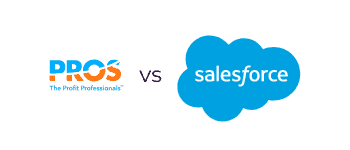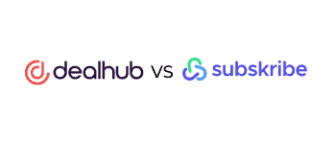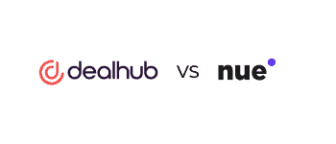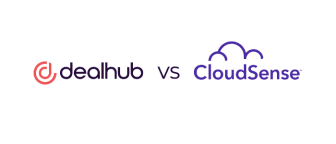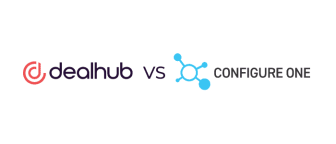Introduction
Compare PROS CPQ and Salesforce CPQ
CPQ software presents a significant benefit for companies with complex product offerings or those needing to generate quotes quickly and accurately. Both PROS CPQ and Salesforce CPQ can streamline the quote-to-cash process, but each has unique features and capabilities.
PROS provides a comprehensive solution to optimize digital and physical commerce and deliver intelligence. It offers businesses robust product catalogs, powerful quote management, advanced market segmentation, and personalized price optimization.
With AI-powered capabilities for configuring products, streamlining agreements, and real-time pricing delivery across all channels, users can interact more effectively with customers while selling tailored offerings. This integrated platform also has CRM tools and an API for greater operational efficiency.
Salesforce is the leader in customer relationship management (CRM) software, and its CPQ solution offers businesses an integrated suite of tools to streamline their quote-to-cash (QTC) processes. It includes quotation, product configuration, ordering, and invoicing (among other features).
Salesforce CPQ works inside Sales Cloud and Revenue Cloud to give customers a seamless experience and faster time-to-quote. Organizations have a streamlined tech stack and valuable customer intelligence when working alongside other Salesforce tools.
Product Overview
Overview of each CPQ Solution
Choosing the right Configure, Price, Quote solution is crucial for streamlining sales processes and driving profitability. PROS CPQ stands out for its advanced AI-driven pricing capabilities, while Salesforce CPQ integrates seamlessly with the Salesforce CRM, offering a more streamlined experience for companies already using the Salesforce ecosystem.
Defining PROS CPQ
PROS Smart CPQ is an AI-driven, cloud-based and on-premise software that enables sales teams to personalize, automate, and streamline sales processes. The software offers a comprehensive suite of pricing, ordering, and inventory management tools for organizations with complex product offerings.
PROS CPQ features include advanced product configuration, market segmentation, and customer analytics to help businesses make smarter decisions about where to invest their sales and marketing efforts. It also provides powerful quote management capabilities to streamline the process from inquiry to approval.
Beyond its basic functions, PROS CPQ integrates with CRM systems to automate tasks like creating opportunities and deals. It also provides a single view of pricing, parts creation, and automatic BOM (bill of materials) creation, making it well-suited to the manufacturing and engineering industries.
Defining Salesforce CPQ
Salesforce CPQ is an integrated suite of tools designed to accelerate the quote-to-cash (QTC) process. With features like pricebooks, product catalogs, and discount rules integrated with Salesforce CRM, customer data management and quote generation have never been easier or more efficient.
Salesforce is a software platform that targets all types of businesses, big and small. But where Salesforce CPQ really shines is at the enterprise level. Its flexibility with custom coding and ready integration with Salesforce AppExchange products make it a robust solution for organizations with business needs beyond complex product and service offerings.
For companies with complicated needs and the budget to solve them, Salesforce provides a unified quote-to-cash experience that can’t be matched.
Product Features
Comparison of Key Features
When comparing PROS CPQ and Salesforce CPQ, both offer a range of powerful features designed to enhance the quoting process for sales teams, though they approach it differently.
PROS CPQ excels in providing AI-powered pricing optimization, which helps companies configure prices based on real-time market data, historical trends, and other variables to maximize profitability. Its integration with PROS pricing solutions allows sales teams to receive intelligent recommendations for price adjustments, helping them make data-driven decisions.
Additionally, PROS CPQ offers robust configuration tools that enable users to create customized product bundles, complex pricing structures, and multi-dimensional product configurations, making it ideal for businesses with intricate sales processes.
On the other hand, Salesforce CPQ integrates seamlessly with the Salesforce ecosystem, leveraging the CRM’s customer data to enhance the sales process. It simplifies quoting by providing a user-friendly interface for creating quotes, proposals, and contracts, all within Salesforce’s cloud-based platform.
With features like guided selling, product configurators, and subscription management, Salesforce CPQ allows sales reps to quickly generate accurate quotes tailored to customer needs. Moreover, it supports automating approval workflows and pricing rules, ensuring consistency and accuracy in the quoting process.
While Salesforce CPQ does not offer the same level of advanced AI pricing optimization as PROS, its deep integration with Salesforce makes it an excellent choice for companies already invested in the Salesforce environment.
Here’s an overview of the product features of each:
| PROS Smart CPQ | Salesforce CPQ |
|---|---|
| A centralized platform for quote and proposal management, B2B commerce, and document generation. | Microservices architecture with Revenue Cloud functionality as an add-on. |
| Readily integrates with popular CRMs, including Salesforce and Microsoft Dynamics, and offers ERP automation out-of-the-box for manufacturers, distributors, and retailers. | Hosted on Sales Cloud for CRM and selling activities and part of Revenue Cloud for proposal generation, invoicing, and billing capabilities. |
| Long implementation time, but standard for an enterprise product. | IT implementation takes an average of 6-9 months. |
| Tailored workflows help sales reps navigate through various selling options in the product catalog. | Pre-built guided selling capabilities are available, but more intricate workflows require custom coding. |
| AI and customizability features are built into the product, and ready to work with higher-tiered plans. | Scaling up with additional features or software additions requires specialized expertise—incurring additional expenses. |
| Software accounts for product availability to automatically determine whether or not customization is possible. | Each price quote is delivered as an attachable file, and any alterations necessitate a new version of the document. |
| Most features available within the software and its plans. | Additional features and licenses available for added costs. |
| Automated bill of materials (BOM) creation, parts quoting, customer-specific sales agreement terms, and order submission to ERP functionality minimize back-and-forth between buyers and vendors. | Customer communication within the Salesforce platform and its partners (like Slack). |
| Customer-specific sales discounting and pricing features that change with subscriptions. | Subscription management and complex billing capacity for purchase orders, one-off projects, and client invoices. |
| AI-powered recommendations for discounting, pricing, upselling, cross-selling, and opportunity creation. | Detailed reporting analytics for customized pricing strategies and discount structures. CRM integration for deeper customer analytics. |
| Additional pricing and quoting abilities for subscription sales. | Full-cycle quote-to-cash automation with Revenue Cloud. |
| Web-based platform. | Web and mobile (iPhone and Android) platforms. |
| Email help desk Phone support FAQ Forum Knowledge base | Phone support Knowledge base Chat FAQs/Forum Online support Salesforce Trailhead In-person training Documentation |
Customer Size
Ideal Customer Profiles
Both PROS CPQ and Salesforce CPQ cater to a wide range of businesses, but they tend to attract different types of customers based on their specific needs.
PROS CPQ is particularly favored by mid-sized to large enterprises, especially those in manufacturing, retail, and distribution industries, where complex pricing models and multi-dimensional product configurations are essential. Its advanced AI-driven pricing and robust configurability make it ideal for businesses with intricate sales processes that require sophisticated solutions to manage dynamic pricing, optimize profit margins, and handle complex product bundles.
Salesforce CPQ, on the other hand, is widely adopted by businesses of all sizes, with a strong focus on companies already using Salesforce as their primary CRM. Salesforce CPQ is ideal for organizations seeking a unified platform to manage customer relationships, quoting, and contract generation in one place.
Pricing
Breakdown of Pricing Options
Both PROS CPQ and Salesforce CPQ offer subscription packages that vary depending on the size of the customer. Both companies provide discounts for annual contracts, as well as custom pricing for enterprise customers.
Neither company offers “competitive” pricing by any means, however. Since they are both designed to serve enterprise customers, they are generally more expensive than other CPQ solutions.
PROS Smart CPQ’s base-level option costs $60 per user per month. It has all of the features available in standard CPQ products, but not many of the customizability features of its higher tiers.
The higher tier of PROS CPQ is $75 per user per month, and it comes with BOM automation, rules-based price configuration, API access, and many of the other features that make it a true enterprise solution.
At the highest tier, PROS’s pricing is entirely quote-based—users need to talk to sales if they are looking for features like CRM opportunity recommendation, churn detection, and cross-sell/upsell recommendations.
Salesforce CPQ has a similar pricing structure, but at almost double the price. The low tier of its product is $75 per user per month, and its next tier is $150. This includes features like account-specific pricing, real-time insights, and automated workflows.
For Revenue Cloud integration (for billing and other quote-to-cash features) and more advanced features, Salesforce’s pricing is entirely custom.
| PROS Smart CPQ | Salesforce CPQ | |
|---|---|---|
| Product Pricing | Essentials: $60 per user per month (billed annually) Advantage: $75 per user per month (billed annually) Ultimate: Contact sales | CPQ: $75 per user per month (billed annually) CPQ Plus: $150 per user per month, billed annually CPQ + Billing Growth: Contact sales CPQ + Billing Plus: Contact sales |
| Implementation Fees | Higher costs for API and app development. | Ongoing implementation fees for custom-coded functionality and system integration. |
| Additional Licenses | Additional license fees for price optimization and industry-specific features.Higher tier requirement for many of the AI and automation features the product boasts. | Additional license fees for e-sign, contract management, buyer engagement tracking. |
Not accounted for in either pricing structure is the cost of implementation and training. Both companies offer a variety of options to get customers up and running quickly, but these can become costly depending on how complex the customer’s needs are.
Salesforce, in particular, has a notoriously long and complex implementation cycle for new customers. The company offers premium IT consulting through its team and certified third-party consultants, but that cost can add up to thousands (or tens of thousands) if the customer needs more than a basic setup.
Summary
Considerations for Choosing Between the Two Solutions
Both platforms have strengths that cater to different business needs—PROS CPQ for businesses seeking AI-driven pricing and advanced configurability, and Salesforce CPQ for those looking for a solution tightly integrated with their existing CRM workflows.
PROS CPQ and Salesforce CPQ are solid options for an enterprise CPQ software. For companies smaller than enterprise or in a non-enterprise market, however, they may be too expensive and offer features that are not needed. For freelancers and small business owners specifically, many other solutions are purpose-built for those needs.
Both solutions offer robust features and integrations at different price points for larger enterprise customers. PROS is much cheaper per user than Salesforce and its implementation costs are known to be high. Still, Salesforce offers advanced features and integrations that can be worth the extra cost, especially if the prospective user is an existing Salesforce customer.
In any case, extensive research before making a buying decision is critical. Looking at multiple options before such a significant undertaking is a must for any customer.
FAQs
Frequently Asked Questions
CRM and CPQ are intrinsically connected. With Salesforce’s CRM (i.e., Sales and Marketing Cloud), sales reps, marketers, and everyone in between can create and engage prospects with greater efficiency. The integrated Salesforce CPQ solution simplifies product management while streamlining the quoting process from start to finish. Working together, the two solutions enable customers to close deals faster and maximize revenue.
Salesforce CPQ is not free. The low tier of its product is $75 per user per month, and its next tier is $150. For Revenue Cloud features built-in with Salesforce CPQ, Salesforce uses a quote-based pricing model. In many cases, a conversation with a sales rep is needed to determine the true cost of using Salesforce CPQ.
With Salesforce CPQ, you don’t need to be a coding whiz. But it is helpful if you can customize the codebase or configure plug-ins based on your organization’s expectations. As a Salesforce CPQ Developer, proficiency in Apex Triggers and Code, VisualForce Page Components, SOSL, and SOQL is essential for success. Salesforce offers training and certification in all of these areas.
PROS’ revenue and profitability realization platform was designed to optimize your sales process with Salesforce CPQ. It’s a smart solution that uses predictive analytics capabilities, resulting in accurate product recommendations at the right time. Although PROS is its own product, it works well with Salesforce and is available via the Salesforce AppExchange.
PROS CPQ is generally less expensive than Salesforce CPQ on a per-user basis, but implementation and training costs can add up quickly depending on the customer’s needs. Salesforce has a longer and more complex setup process that can be costly, but its advanced features may be worth the additional cost for large enterprises.

Andrew is a professional copywriter with expertise in creating content focused on business-to-business (B2B) software. He conducts research and produces articles that provide valuable insights and information to his readers.

